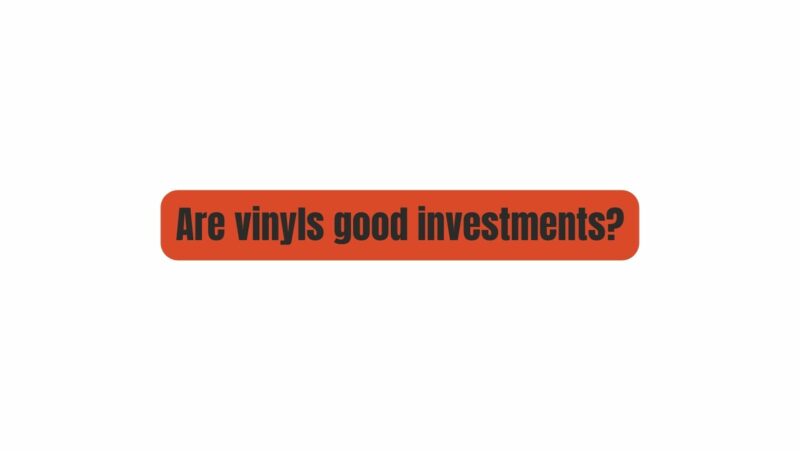In an era dominated by digital streaming services and mp3 downloads, the resurgence of vinyl records is nothing short of remarkable. Music enthusiasts and collectors alike have witnessed the resurgence of vinyl records over the past decade. But beyond the joy of listening to analog music, an intriguing question emerges: Are vinyl records good investments? This article delves into the world of vinyl records, exploring their history, market trends, and the factors that make them a unique investment option.
Chapter 1: The Resurgence of Vinyl Records
1.1 The Vinyl Revival
Vinyl records, long thought to be relics of the past, have made a significant comeback. This resurgence can be attributed to various factors, including nostalgia, audiophile preferences, and a desire for tangible music experiences.
1.2 Vinyl’s Enduring Appeal
One of the key reasons for vinyl’s enduring appeal is its unique sound quality. Audiophiles argue that analog recordings on vinyl offer a warmer and more authentic listening experience compared to their digital counterparts.
Chapter 2: The History of Vinyl Records
2.1 Birth and Evolution
Vinyl records, introduced in the late 19th century, have a rich history. They evolved from shellac and wax cylinders to the iconic 12-inch LPs and 7-inch singles we know today.
2.2 Vinyl’s Dominance and Decline
Vinyl records dominated the music industry for decades before ceding ground to cassettes, CDs, and digital downloads. The decline of vinyl was attributed to various technological advancements and convenience factors.
Chapter 3: The Vinyl Market
3.1 Vinyl’s Resurgence in the 21st Century
The early 21st century witnessed the reemergence of vinyl as a popular format. Sales soared, and vinyl records became a symbol of the resurgence of physical music.
3.2 Market Trends and Statistics
In this section, we delve into market trends, discussing sales figures, genres that perform well on vinyl, and the impact of Record Store Day on the vinyl market.
Chapter 4: Factors Affecting Vinyl Record Value
4.1 Rarity and Scarcity
One of the primary factors influencing vinyl record values is their rarity. Limited editions, special releases, and records by popular artists can command high prices in the collector’s market.
4.2 Condition and Grading
The condition of a vinyl record is paramount. Collectors use grading systems to assess a record’s condition, with factors like scratches, warps, and the condition of the sleeve playing a crucial role in determining value.
4.3 Historical Significance
Records that played a pivotal role in music history or cultural movements often have higher value. We explore examples of such historically significant records.
Chapter 5: Collecting Vinyl Records as an Investment
5.1 Appreciation Over Time
Many collectors view vinyl records as assets that appreciate in value over time. We examine historical data and case studies to illustrate how certain records have gained substantial value.
5.2 Diversification Benefits
Investing in vinyl records can be seen as a form of diversification. We discuss how vinyl records can complement a traditional investment portfolio and provide a hedge against market volatility.
Chapter 6: Challenges and Risks
6.1 Market Volatility
While vinyl records have shown consistent growth in recent years, it’s essential to acknowledge the potential for market fluctuations.
6.2 The Costs of Collecting
Collecting vinyl records can be costly, especially when pursuing rare or limited-edition releases. We provide insights on how to manage the costs of collecting.
Chapter 7: Tips for Vinyl Collectors and Investors
7.1 Research and Education
In this section, we offer advice on researching vinyl records, staying informed about market trends, and becoming a knowledgeable collector or investor.
7.2 Storage and Maintenance
Proper storage and maintenance are essential to preserving the value of vinyl records. We share tips on how to care for your collection.
Conclusion
Vinyl records have experienced a remarkable resurgence, both as a medium for music enthusiasts and as potential investments. While they offer the allure of nostalgia and a unique auditory experience, their value as investments depends on various factors, including rarity, condition, and historical significance.
As with any investment, collecting vinyl records carries risks and challenges. Market volatility and the costs associated with collecting should be carefully considered. However, for those who appreciate the tangible connection to music history and the potential for financial gain, vinyl records can indeed be good investments.
Ultimately, whether vinyl records are a good investment depends on your passion for music, your commitment to research, and your willingness to navigate the collector’s market. Regardless of their financial prospects, vinyl records will continue to hold a special place in the hearts of music enthusiasts worldwide.

